- Tell us about yourself: Christy Swan. I completed Principal Certification in 2016
- What are you doing now?: Assistant Principal of Chester and Ponderosa Elementary in Central Valley School District
- Why did you choose a program in the School of Education at Gonzaga? Not only does Gonzaga have a stellar reputation for education, it also met my needs for earning my certificate while teaching and completing an internship. The pace of the program was ideal, allowing me to finish my work in a year.
- What influenced you the most during your time at Gonzaga? Dr. Cynthia Johnson had a huge impact on my work. She pushed my thinking and offered experiences that challenged me while also helping to develop my confidence in school leadership. Cindy was supportive, encouraging, and without a doubt an advocate for all in the program. It was, and still is, her main focus that all candidates leave ready to enter the field of school leadership and do so with passion and excitement.
- What was your greatest lesson learned at Gonzaga? The greatest lesson I learned at Gonzaga was the power of a cohort. I believe working through the program with others was pivotal in helping me feel supported and engaged. We were all able to share experiences, grow one another’s thinking, and celebrate our successes.
- What is the most rewarding aspect of working in your field? Most challenging? Hands down, the most rewarding part of working in my field is serving others. It is my “why.” My purpose for coming to work each day is to serve those around me and to ensure that their needs are met. I am lucky enough to work with amazing students, teachers, support staff, administrators, parents, and community members. The most challenging part of my job is there are not nearly enough hours in the day to do all I believe is necessary to fulfill my role. With that challenge, I have learned to balance my time prioritize my “to do” and enjoy the ride!
- What critical issues do you see that need to be addressed in your field? A critical issue I believe that needs to be addressed in education is the mental health of students. We serve many students of complex trauma and other outside factors that need support. Currently, we are limited in all that we can do to help these young kids.
- What advice do you have for future education professionals? Make sure you know your “why.” It guides you in all that you do.
Tag: dela
This is the third and final part in a series featuring the value of a cohort-based approach to graduate education.
Dr. Elaine Radmer spent the last two years advising a group in Fernie, British Columbia. The Fernie cohort perfectly highlights the value of Gonzaga’s site-based approach. “All but one of the educators were from a single school district, but that district spans a number of communities,” Dr. Radmer wrote. “Geographically, they are spread along a single highway, but it takes almost two hours to travel between the outermost cities.” Candidates from the cohort have a story to tell about the way the program transformed their educational practices and philosophy.
- Penny did her capstone on improving the experience for athletes through recognition dinners and social media. This rejuvenated her passion for the role she plays as athletic director. On paper, it seems like a small part of her job, but in reality, it is a huge commitment. Her capstone work led to many more plans for improvement – coaching clinics, sports camps, etc… Additionally, in an effort to involve the community in sports programs, she created the first alumni basketball game, which has become a highly successful fundraiser.
- Jill continued her work as leader in school literacy goals, working on a collaborative literacy grant with colleagues. They implemented two school-wide initiatives. The first, “Storm Reads Challenge,” set a school wide goal of reading 500 books (which they exceeded) and featured grade level competitions (Grade 7 read more books than any other grade). The second, “Storm Reads Week,” saw every human in the school spend 15 minutes reading during an assigned time.
- Leanna implemented the “MindUp” program in Kindergarten/Grade 1 class. It is a social-emotional learning program to teach mindfulness and improve self-regulation. Their class made a Gratefulness tree bulletin board and invited anyone at the school to add a leaf so it would grow over time.
- Kathy has started to work with Grade 4 through Grade 6 students at her school to apply math in designing a garden housed at the school.
- Andrew started making movies to highlight student achievement. He started with his own classes, but now has a leadership role across the school — gathering videos and pictures and posting “highlight reels” on school websites.
- Renee is a Kindergarten teacher who is passionate about student activity levels. She developed and delivered materials to help kids at all grade levels understand options for being active at recess and expectations for their behavior (e.g., problem solving rather than fighting, etc.). Due to her efforts, kids became more active at recess and teachers reported fewer behavioral problems. She also implemented several other school-wide initiatives. She changed the volleyball approach to Triple Ball, which gives younger kids more chances to play and gain skills. To do this, she gained approvals from senior management, and then collaborated with a local college to provide training. Ultimately, she organized a district tournament that was a hit in the community. She also implemented a Golden Shoe challenge to inspire everyone to ride, bike, scooter, or walk to school.
- Ian created a collaborative, school-based team that launched an initiative to explore inter-curricular inquiry-driven projects. They changed the bell schedule to create “Inquiry Fridays” for project-based learning. On Fridays, three teachers from different subjects worked together on grade-wide inquiry teams. Ian’s background and expertise as an outdoor education instructor was helpful to support this initiative. In addition, Ian stepped into leadership by organizing activities: staff events, school-wide track-and-field event, and a field trip to Calgary for cultural experience for students in Social Studies and English.
- After deciding to commission an art piece as a focal point at the school’s entryway, Jane collaborated with the staff and allowed the plan to evolve until the artwork represented the recent combination of two schools into one. She raised over $3,000 for this project. The unveiling will be in the fall. She also wrote a grant for a collaborative project to build a greenhouse at their school. As an inquiry project, students filled out the permit application, drew up plans, and decided how to heat the greenhouse.
Check out our first post in this series: Alumni in Action: The Elk Valley Arch
Check out our second post in this series: Alumni in Action: The Rainbow Crosswalk Project
This is the second part in a series featuring the value of a cohort-based approach to graduate education.
Dr. Elaine Radmer spent the last two years advising a group in Fernie, British Columbia. The Fernie cohort perfectly highlights the value of Gonzaga’s site-based approach. “All but one of the educators were from a single school district, but that district spans a number of communities,” Dr. Radmer wrote. “Geographically, they are spread along a single highway, but it takes almost two hours to travel between the outermost cities.”
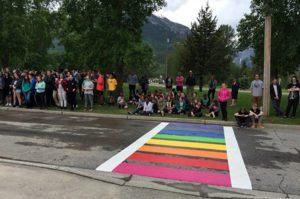
The Rainbow Crosswalk in Fernie. Shared from e-know.ca
Inspired to undertake additional project with students to improve their communities, Tara and Janet spearheaded the Rainbow Crosswalk project in Fernie, BC. In her role supervising the Student Council, Tara was able to mobilize the students. The project unfolded over months, as community experts came to school, students taught lessons to peers, and they presented to school and city boards. The project culminated with the painting of a crosswalk by the high school and four additional crosswalks in the downtown area to promote inclusion. Local media covered the project:
https://www.e-know.ca/regions/elk-valley/fernie/first-rainbow-crosswalk-opened/
Check out our first post in the series: Alumni in Action: The Elk Valley Arch
This is the first part in a series featuring the value of a cohort-based approach to graduate education.
The Department of Leadership & Administration is celebrating the 40-year anniversary of our Master’s programs in Canada. For four decades, the department has formed cohorts of working educators in their locales, and applied course content and assignments in their professional settings. Graduates of our Master’s programs have consistently reported that the program changed their life.
Dr. Elaine Radmer spent the last two years advising a group in Fernie, British Columbia. The Fernie cohort perfectly highlights the value of Gonzaga’s site-based approach. “All but one of the educators were from a single school district, but that district spans a number of communities,” Dr. Radmer wrote. “Geographically, they are spread along a single highway, but it takes almost two hours to travel between the outermost cities.”
In many ways, the Fernie cohort is very typical for our programs. Their coursework structured for application in our students’ professional work, so at the end of their program, they have a list of accomplishments advanced by their involvement in the program. Graduates often tell us that the program modeled experiential education for them. Faculty think of it as Ignatian pedagogy.
Our latest Fernie cohort’s graduation year coincided with another celebration: Canada 150 (a provincial change to the curriculum structure. Their district responded to B.C.’s new curriculum by encouraging project-based learning. Inspired by the cohort’s collaboration, their instructors, and the program content, some of our candidates decided to facilitate students in a project that would memorialize Canada 150 and represent unity among different schools who typically only compete in sports. Thus, the Elk Valley Arch project came to realization.
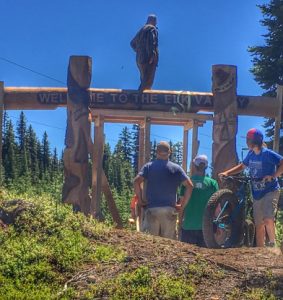
The Elk Valley Arch. Shared from elkvalleyarch.com
One of the candidates in the cohort, Steve, envisioned and spearheaded this major inter-provincial project, involving four schools to design, build, and erect 14’ x 16’ cedar archway at the top of mountain pass on Alberta/B.C. border. The story and images of the 3,000 kg arch are on a student-launched website, which was part of the learning embedded in the project: https://elkvalleyarch.com/.
Preparation spanned 10 months. Steve wrote 10 grants, raising $23,000 for the project. He involved colleagues, administration, School Board, government officials and private business people. They were able to obtain permissions to build the structure on crown land leased by a hydro company.
Students in a number of classes at the different schools were involved in designing, creating and transporting the memorial. In Sparwood, Social Studies and Grade 5 students helped identify symbols of the valley. The metal shop built a cart to haul the massive logs up mountain. The Woods class worked on the scaffold. Foods classes prepared granola for students to eat while camping, etc…
Students also played leadership roles in Elkford. Students presented the concept to the Town Council, informed the media and newspaper, and sought out businesses and volunteers willing to support the project.
Seven staff from 3 different schools, 5 volunteers, and 20 students moved the wood up the mountain by hand, and then constructed the arch. Local media covered the Arch. Additionally, a group of students participated in a 3-day outdoor education program, camping on the mountain.
Over the last few years, our departments have worked to create dynamic, new offerings that meet the demands of the ever-changing world. This required comprehensive reviews of our current curriculum, identification and development of new material, and the willingness to evolve to stay ahead of the curve. The dedication and effort of our faculty is apparent as we are launching two new programs in the coming year: our Doctor of Educational Leadership (Ed.D.) and Master of Education in Educational Leadership (online).The new programs increase our program offerings to 3 Undergraduate majors and 16 Graduate or Doctoral options across five academic departments.
- Our Ed.D., housed in the Department of Educational Leadership & Administration, will enroll the first cohort in Summer 2018. This 51-credit hybrid program prepares candidates for administrative, academic, professional, and research positions in education, civil organizations, private organizations, and public institutions. In American universities, the Ed.D. is recognized as qualification for appointment as a professor.
- Our Master of Education in Educational Leadership (online), also housed in the Department of Educational Leadership & Administration, will enroll the first cohort in Summer 2018. This degree is designed for working educators, with a focus on linking theory and research to practical issues in teaching and leadership using their local districts as the context for their study. Students are welcomed into an online cohort of educators and experience the benefits of a collaborative learning community delivered in a dynamic, fostering environment.
The application for admission to each program is open and we are already reviewing potential candidates’ applications. Spread the word: Apply Today!
For 40 years, the Department of Educational Leadership and Administration (DELA) has provided high quality masters programs across British Columbia (BC) and Alberta (AB), graduating knowledgeable, skilled, and committed leaders who operate from a strong value base. This year marked the 40th anniversary of program offerings in Canada, and three celebrations were held across the provinces over the summer. Faculty, alumni, and friends of the program united in Victoria, BC; Kelowna, BC; and Calgary, AB, for food, fellowship, and festivity. “The impact of our graduates reaches nearly everywhere across BC and AB,” Dean Alfonso remarked. “We are proud to celebrate our alumni and our department on this impressive milestone.”
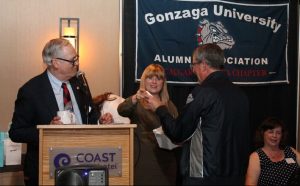
40th Anniversary Celebration in Kelowna, BC.
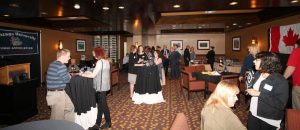
40th Anniversary Celebration in Kelowna, BC.
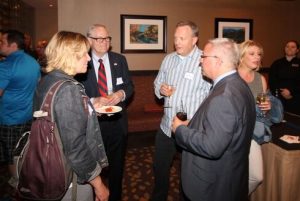
40th Anniversary Celebration in Kelowna, BC.
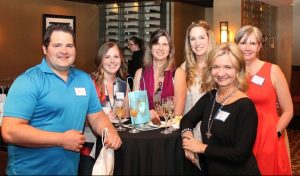
40th Anniversary Celebration in Kelowna, BC.
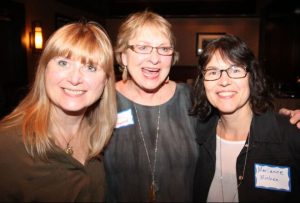
40th Anniversary Celebration in Kelowna, BC.
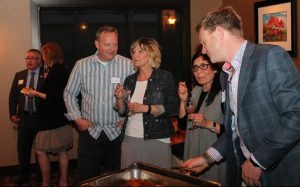
40th Anniversary Celebration in Kelowna, BC.